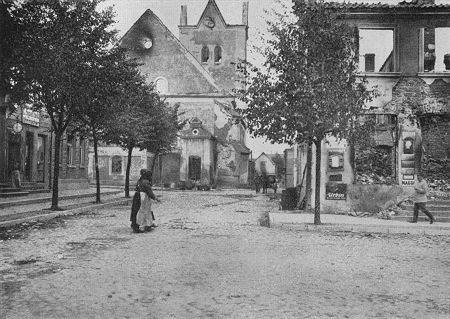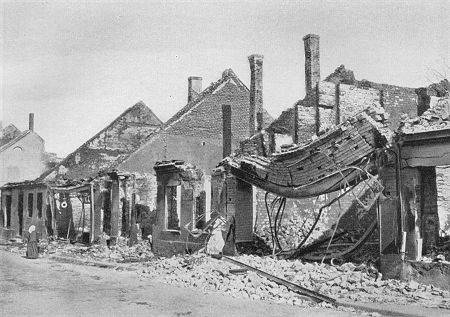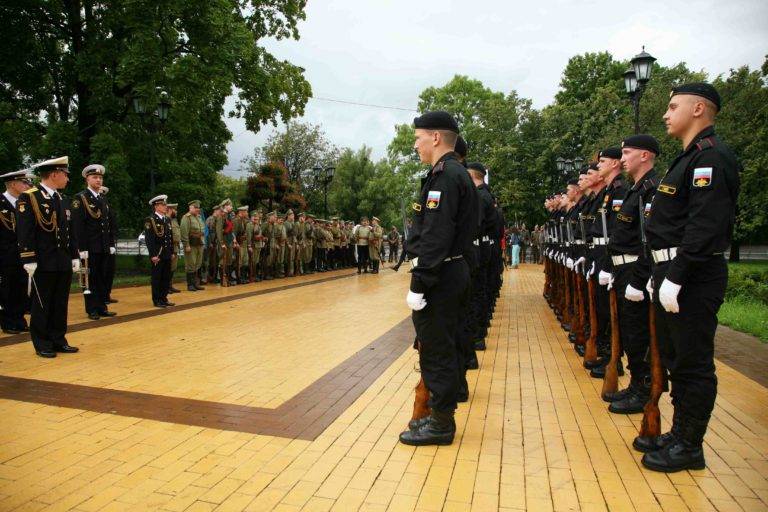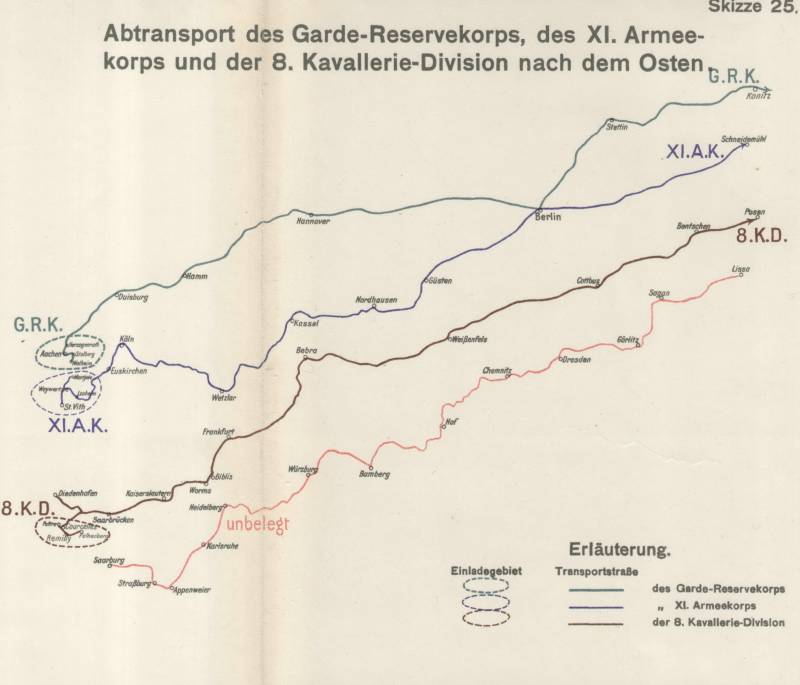The decisive battle of the First World War. East Prussian operation 1914 of the year. Let's sum up
The strategic goal of the actions of the German 8 Army was to bind Russian forces and gain time for the transfer of German troops from the Western Front after the defeat of France — that is, was to contribute to the implementation of Schlieffen’s strategic planning. For the Russians, the strategic goal of the operation was to influence the German-French front — that is, the disruption of Schlieffen’s strategic planning. And exactly what the authors of the Schlieffen Plan were trying to avoid: the Germans weakened the strike group on the French front for the sake of the interests of a secondary theater of operations (and the plan even allowed East Prussia to succeed in the name of the success of the main operation in France).
The desire to keep East Prussia wore a pronounced moral and political tint, which acquired strategic consequences. It should be remembered that the hasty and not always thought-out actions of the Russian troops had the main task of helping and maximally alleviating the position of the allied French army.
What are the most important results of this operation?
1. The most important objective of the operation for Russia was to help the French front, and only then the task of mastering East Prussia to provide the main forces of the Russian army in Galicia and Poland.
As we have already noted, with the outbreak of a coalition war with Germany, the Russian Empire was supposed to begin hostilities after the 15 day of mobilization. The Allies very much hoped for the activity of the Russian troops of the German front, waiting for the offensive with undisguised tension.
And if the fulfillment of the task by the command of the North-Western Front in East Prussia turned out to be completely beyond the mark, the Russian General Headquarters was beyond reproach - he did not forget about the main theater of operations (Galicia), did not forget about the allied duty, did not take a great interest on selfish goals [Svechin A. A. "A" or "G"? // Warfare. - 1918. - No. 25. - C. 12].
And it was the all-union component of the operation that was performed. The hurried offensive, which had a disastrous result in the context of the Russian solution of its particular task, had a huge strategic result for the Allies in the Entente and for the whole war.
2. The transfer of troops during the operation looked as follows: for the Russians, the 26 Army Corps to the 1 Army and separate formations (only during the Mazursky battle, secondary divisions are suitable), for the Germans, the 11 Army, the Guards reserve corps (4 infantry) divisions - 22-I and 38-I infantry, 3-I Guards and 1-I Guards reserve), 2-I and 8-I cavalry divisions.
But while for Russians the transfer was planned, for Germans the transfer of such large units from the French front to East Prussia (in fact, 25% of the 8 Army grouping was transferred) was one of the reasons for Germany’s defeat in the Marne battle in the West European theater.
3. The strategic result of the East Prussian operation was:
1) in weakening the German Western Front;
2) in granting Russian troops freedom of action in Galicia (the result is the victory of the epic and sign Galicia battle);
3) in turn, the stabilization of the French front and the urgent need to help out the Austrian allies (the withdrawal from war of Austria-Hungary led to the inevitable loss of war by the entire German bloc) became the cause of the future shift of the center of gravity of the block’s operations to the East. There is a tendency to strengthen the German forces of the Russian Front with their design in an independent command.
The transfer of 2 corps and cavalry division of the Germans from the French front to East Prussia. Scheme: Reichsarchiv. Der Weltkrieg 1914-1918. Band 1. Das deutsche Feldeisenbahnwesen. Die Eisenbahnen zu Kriegsbeginn. Berlin, 1928. From the author's library.
Do not forget about another aspect of the contribution of the Russian armies in the Marne victory - the moral. After all, the originally successful actions of the Russian troops in East Prussia took place in a difficult time for the Allies on the Entente during the Border Battle on the French Front. As A. A. Ignatiev testified on the pages of the official report: “the entire success of the war depends entirely on our actions in the coming weeks until the German corps is transferred to our front ... The spirit of the army continues to hold hope for a final favorable outcome and revenue from our side” [Ignatiev A. A. Decree. cit. C. 41]. He also noted that in the difficult days of the German invasion, Russian successes were the only powerful support for the spirit of the French people. [Ibid. C. 45].
The Germans themselves considered their victory in East Prussia close to a miracle. In the official work devoted to the strategy in the First World War, we find the following lines: “by mid-September, as if by a miracle, all danger to East Prussia was eliminated, although the desired destruction of the Neman army was not achieved” [Moser O. von. A brief strategic overview of world war 1914 - 1918's. M., 1923. C. 40].

City Soldau.

Soldau after the fights.
Initially, the East Prussian operation could be won by the Russian army only with great difficulty - the German 8 Army was more mobile, stronger than each army of the Russian North-Western Front, taken separately. Relying on Lettsensky fortified, she could operate on the flank of any Russian army, smashing the enemy one by one (a similar situation was worked out by the Germans at command and head games before the war). Domestic operating lines and a fortified lake defile made it as easy for the Germans as possible to conduct combat operations, even under the condition of the closest cooperation of the 1 and 2 armies, not to mention other circumstances, the most important of which were mobility and supply issues.
But the actions of the Russian armies led to the transfer of troops from the West by the Germans and A. von Schlieffen’s elaborated and geometrically adjusted plan - G. von Moltke was broken by the heroic actions of the 1 and 2 armies, and Germany was deprived of a chance to win the war. The tactical and strategic advantages of Germany (expressed in the first bright plan of the “blitzkrieg”) were eliminated with the prospect of a war of attrition beneficial to the Entente. The undoubted military success of Germany was transformed into a probabilistic one.

Street city Hohenstein after the fighting.
Germany had a chance to emerge victorious in a fight on two fronts - taking advantage of domestic operating lines, try to smash their opponents in turn. That is - using the difference in terms between the French and the Russian and mobilization, take France out of the war [Details see: Pereslegin S. World War and the Crisis of European Military Art // Liddel — Garth B. Encyclopedia of Military Art. M. - SPb, 2003. C. 464-481; Takman B. The first blitzkrieg. August 1914. M., 1999. C. 503-511]. And from the German forces, initially deployed in East Prussia, it was only necessary to keep the front of 10 - 12 weeks. To achieve its main goal of foreign policy - the lightning crushing of France - the Germans sacrificed the interests of the Austrian allies, who were condemned to defeat and the loss of Galicia. Economic and political factors did not allow Germany to wage a war of attrition.
The chance was missed.
There is a strategic success for the Entente, the achievement of goals set before the powers of Concord. This is a prime example of the “Indirect Action Strategy” and the “Coalition Strategy”. Russian help came to the British and French at the right time.
Russia frustrated the enemy’s first blitzkrieg. In fact, after the Marne, the defeat of the war for Germany, not ready for a protracted armed confrontation, was a foregone conclusion. She betrayed the interests of her Austrian ally - and instead of a joint strike with Sedlec on the Sedlec, under the basis of the Polish ledge P. Hindenburg, after the “Tannenberg” victory, she decided to squeeze the Russians out of East Prussia - that is, she preferred purely German interests to all-coalition. And on the contrary, the Russian military-political leadership gave priority to general-public interests - and with a similar approach from other allies in the Entente, this circumstance could be the key to a quick and successful conclusion of the First World War.
Yes, our army did not get to Berlin in 1914, as in 1945, but it did not allow the Germans to march around Paris in 1914, as in 1940!

A company of the guard of honor of the Western Military District at a commemorative event in honor of the 103 anniversary of the Gumbinnen battle.

Information